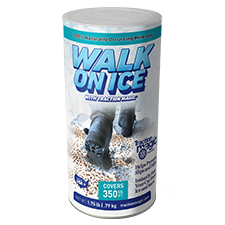What To Use Instead Of Salt On Concrete
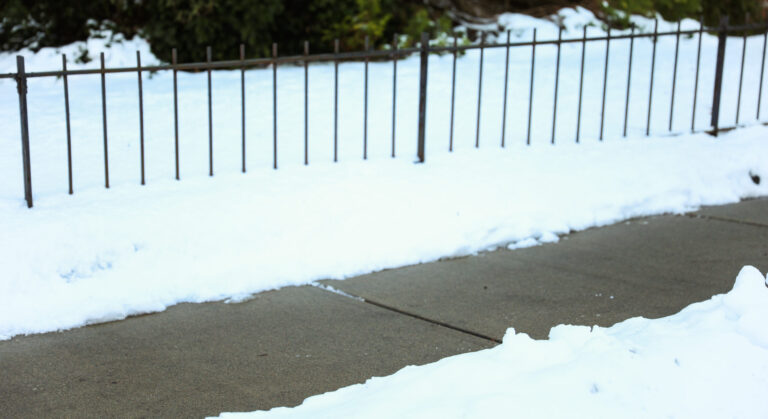
What to Use Instead of Salt on Concrete
Using traditional deicing salts like sodium chloride on concrete can lead to long-term damage, environmental harm, and health risks. While salts are effective at melting ice, they are not the best choice for maintaining the integrity of concrete driveways or protecting the surrounding environment.
This guide explores eco-friendly and cost-effective alternatives to deicing salts, their impact on concrete driveway cost, and why choosing safer products is essential for households with pets and children.
Concrete surfaces, whether it’s your driveway, walkway, or patio, often become treacherous in the icy, wintry months. It’s almost instinctive for us to reach out for a bag of salt to melt away the danger. However, while salt might be a popular de-icing agent, it’s far from being the best choice for concrete surfaces. Why? Let’s delve into the problems with salt and explore safer and more effective alternatives.
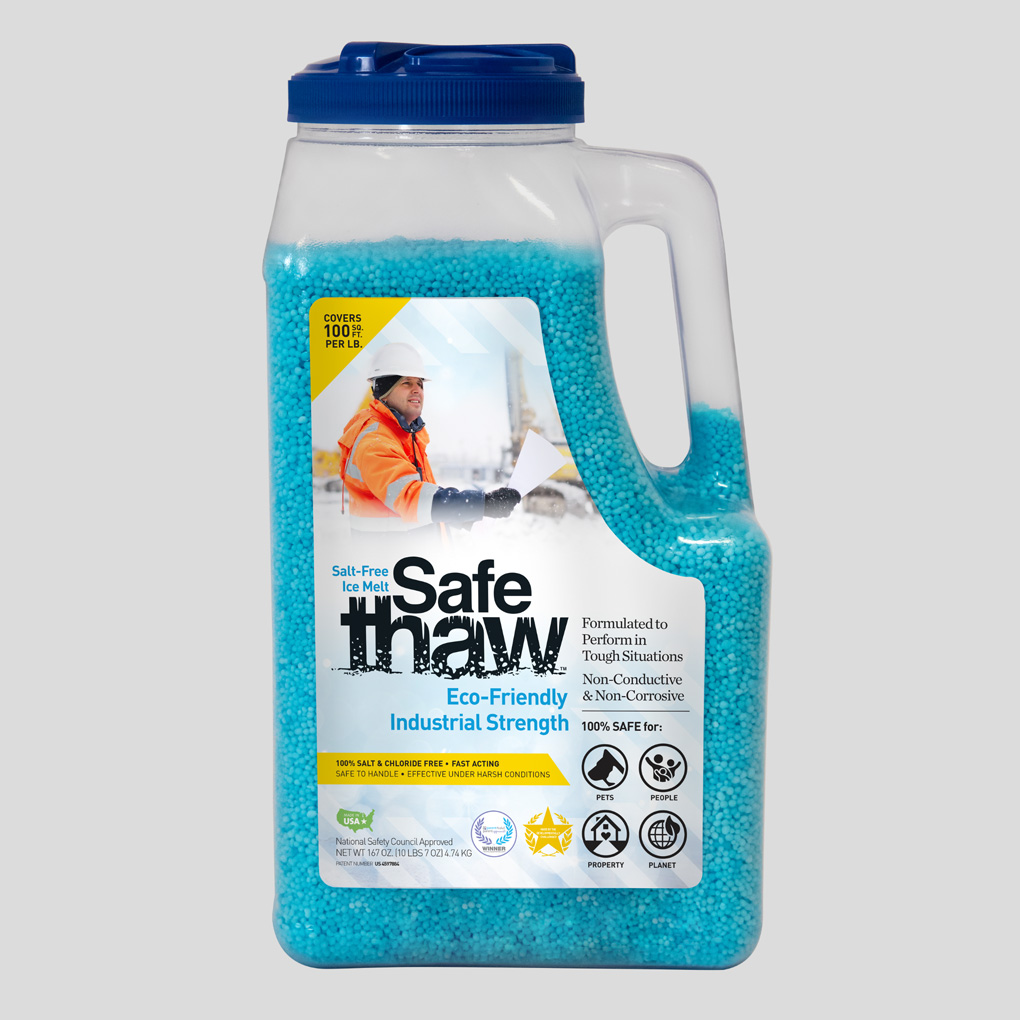
Safe Thaw
Safe Thaw was created as the ice management solution for tough winter environments. Ideal in commercial and industrial properties, shops, government agencies, bridges, and construction.
Concrete vs Asphalt Driveway: Which Is Better?
Choosing the right driveway material affects maintenance costs, especially in winter. Let’s compare concrete vs asphalt driveway cost to help you make an informed decision.
Durability
- Concrete Driveways: Last 30+ years with proper care. Concrete is more resistant to extreme weather and requires less frequent maintenance.
- Asphalt Driveways: Last 15–20 years and need regular resealing, especially in hot climates.
Winter Performance
Concrete is susceptible to salt-induced scaling and spalling, making eco-friendly deicers critical. Asphalt tends to soften in high heat but performs well in colder climates.
Cost Analysis
- Concrete Driveway Cost: $6–$15 per square foot, higher upfront cost but lower long-term expenses.
- Asphalt Driveway Cost: $3–$7 per square foot, cheaper initially but requires more frequent repairs.
Investing in a concrete driveway with safe deicing practices ensures durability and better long-term value.
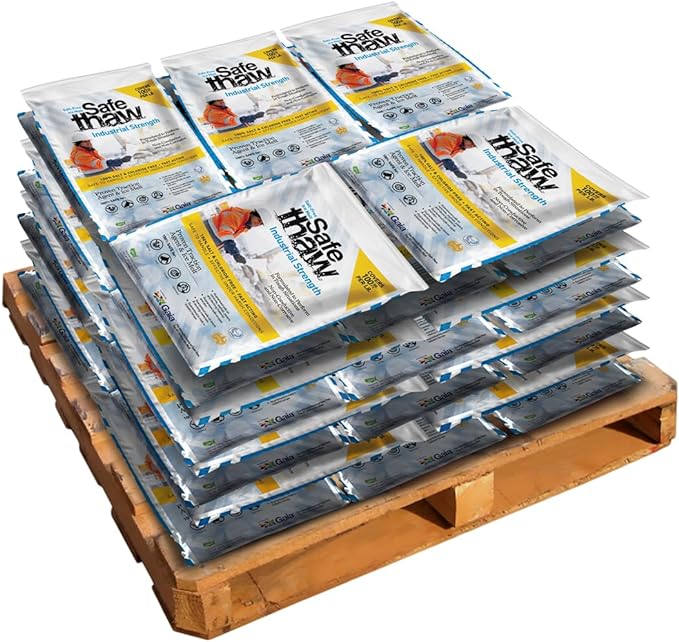
40 Bags
Safe Paw Thaw Industrial Strength Salt-Free Pet Safe Snow Ice Melter and Traction Agent for Concrete, Asphalt, Decks, Lawns, and More, 43 Pound Bag- 40 Bags
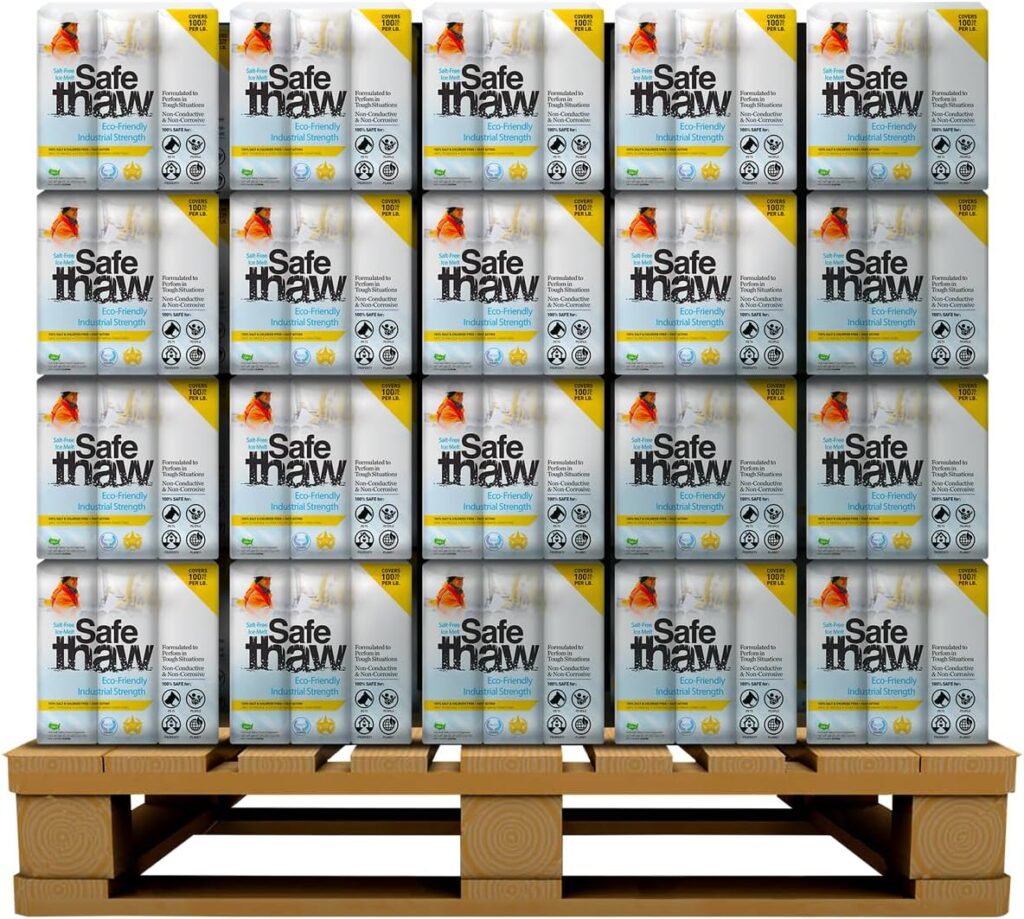
100 Boxes
Safe Thaw Industrial Strength 100% Salt/Chloride-Free, Pet/Paw-Safe Snow & Ice Melter and Traction Agent. Use on Concrete, Asphalt, Roofs & On Any Surface, 30 Pound FlexiPail- 100 Boxes
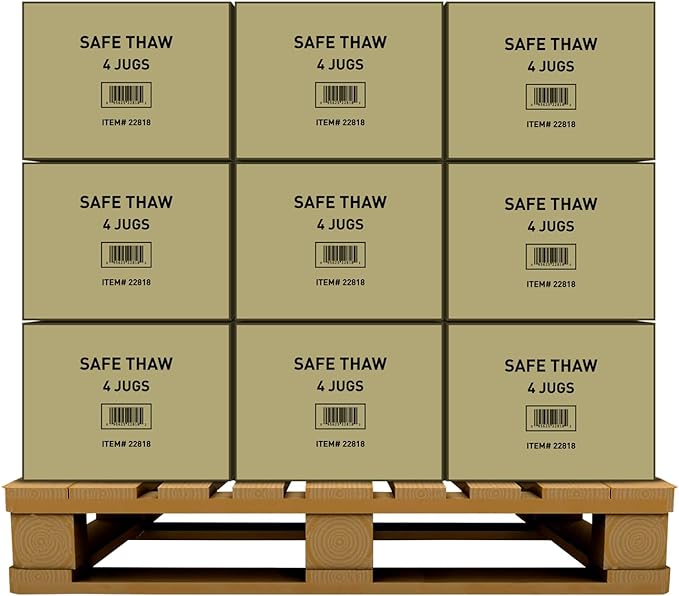
105 Jugs
Safe Thaw Concrete Safe 100% Salt-Free, Pet Safe Snow and ice Melter, Industrial Strength, Chloride-Free, and Traction Agent. Use on Asphalt, Roofs & On Any Surface, 10 Pound Jug- 105 Jugs
The Downside of Using Salt on Concrete
It might come as a surprise to many, but salt, especially when used frequently, can wreak havoc on concrete. Here’s why:
- Corrosive Nature: Salt can be highly corrosive. This means it can accelerate the deterioration of metal reinforcements within concrete structures, leading to potential structural integrity issues.
- Freeze-Thaw Cycle: Salt lowers the freezing point of water. So when the salty slush refreezes, it can lead to an accelerated freeze-thaw cycle. This cycle can cause scaling, where the surface layer of the concrete flakes off, or even spalling, where larger chunks of concrete break off.
- Chemical Reaction: Salt can react with the concrete chemically, leading to discoloration and reduced longevity.
- Environmental Concerns: Runoff from salted concrete can find its way into water systems, harming aquatic life and affecting drinking water.
Soil Degradation
When deicing salts dissolve, they infiltrate the soil, increasing salinity levels. High salt concentrations disrupt the natural nutrient balance, making it difficult for plants to thrive.
Water Contamination
Salt runoff during snowmelt often enters local waterways, increasing chloride levels and harming aquatic ecosystems. This contamination disrupts freshwater habitats and affects the health of fish and other marine life.
Harm to Vegetation
Salt spray and runoff can damage grass, shrubs, and trees, causing browning and long-term stress on vegetation. Protecting landscaping is especially critical for homes with carefully manicured lawns.
Switching to eco-friendly deicing products minimizes these negative effects, helping to preserve soil, water, and plant health.
So, what to use instead of salt on concrete?
Considering these significant downsides, it becomes crucial to find alternatives to salt when dealing with ice on concrete surfaces.
Effectiveness of Alternative Deicing Agents
Several alternatives to traditional salt provide excellent ice-melting capabilities without the damaging side effects.
Beet Juice Mixtures
Beet juice is often combined with brine to lower the freezing point of water. This solution is effective in extremely cold conditions and is eco-friendly, although it can leave stains if over-applied.
Sand and Gravel
While sand and gravel don’t melt ice, they improve traction and reduce the need for chemical deicers. They are cost-effective and environmentally safe, though cleanup may be necessary after the snow melts.
Safe Thaw – A Reliable Alternative
Safe Thaw is a chloride-free ice melt designed for concrete surfaces. It is safe for pets, children, and vegetation while offering strong deicing performance in sub-zero temperatures.
Cost-Effectiveness of Salt Alternatives
When considering deicing products, cost plays a significant role. While traditional salts are inexpensive upfront, their long-term impact on concrete, the environment, and surrounding landscaping can lead to higher expenses.
Upfront vs. Long-Term Costs
- Traditional Salts: Low initial cost but can cause concrete scaling, spalling, and cracking, leading to increased maintenance expenses.
- Salt Alternatives: Higher upfront cost but result in savings from reduced environmental damage and lower driveway repair costs.
Frequency of Application
Eco-friendly alternatives like Safe Thaw often require fewer applications compared to traditional salts, further reducing overall costs.
Protecting Your Investment
Using safe alternatives ensures the longevity of your driveway. A durable driveway reduces the need for resurfacing or replacements, directly impacting your concrete driveway cost in the long run.
Safety Considerations for Pets and Children
Traditional deicing salts pose risks to pets and children, making it essential to choose safer alternatives.
Health Risks of Salts
Sodium chloride and calcium chloride can irritate pets’ paws and cause gastrointestinal distress if ingested. For children, accidental ingestion or contact can lead to skin irritation or more serious health issues.
Pet- and Child-Friendly Products
- Safe Thaw: Chloride-free, non-toxic, and safe for households with pets and children.
- Sand or Gravel: Provides traction without chemical risks, making it safe for outdoor play areas.
By using these alternatives, you can protect your loved ones and ensure a safer outdoor environment.
Concrete Safe Salt Alternatives
If you’re looking to move away from salt but still want effective ice melt solutions, there are several concrete-safe options available.
- Sand: While it doesn’t melt ice, sand provides traction and is safe for concrete. It’s environmentally friendly and doesn’t contain chemicals that harm concrete surfaces.
- Coffee Grounds: An unconventional choice, but used coffee grounds offer traction and can melt ice due to their acidic nature. They also provide a brown tint that can absorb sunlight, helping to warm up surfaces.
- Sugar Beet Juice: While it sounds odd, this byproduct from sugar beets lowers the freezing point of water, and when mixed with traditional road salt, it’s less corrosive and harmful to concrete.
- Cheese Brine: Another unusual solution, cheese brine is a salty liquid that is a byproduct of cheese making. When sprayed over roads, it can prevent ice formation. However, its salt content is lower than traditional road salt, making it a little more concrete-friendly.
- Safe Thaw: If you’re looking for an industrial-grade, effective, and safe solution, Safe Thaw is a perfect choice. It’s a granular ice melt, devoid of harmful chemicals and toxins. Not only is it effective at melting ice, but it’s also gentle on concrete and the environment. Its specially formulated composition ensures that concrete remains unharmed, and there’s no harmful runoff threatening aquatic ecosystems.
A Word on Application
Whichever alternative you choose, it’s essential to apply it correctly. Always read the manufacturer’s instructions if you’re using a commercial product. When using household items like coffee grounds or sand, spread them evenly and moderately. Over-application can lead to messy situations and might not yield better results.
Exploring Homemade Snow Melt and Natural Deicer Options
So, if salt is off the table for concrete safety, what else can you realistically use? You might be surprised to learn that a homemade snow melt can work just as well for lighter snowfalls or spot treatments. A simple mix of warm water, dish soap, and rubbing alcohol can act as a quick fix, loosening ice patches without harming your driveway. Is it as strong as an industrial product? Not quite—but when used for small areas or when you’re in a pinch, it’s a safe and budget-friendly alternative.
The same goes for natural deicer blends, which often incorporate beet juice, sugar byproducts, or even simple household materials. They won’t corrode your surfaces like chlorides do, and they help lower the freezing point of ice to reduce buildup. If you’ve been skeptical about whether natural deicers can hold up in very cold climates, the answer is: they can, but consistency matters. Unlike synthetic chlorides, they might need reapplication sooner.
Addressing Asphalt Driveway Sinking and Chemical Reactions
You may be wondering—does the choice of deicer impact asphalt too? Absolutely. While concrete usually gets the spotlight for salt damage, asphalt isn’t completely immune. The issue here isn’t just surface wear—it’s structural. Over time, freeze-thaw cycles paired with moisture penetration can lead to asphalt driveway sinking, especially if the base layer wasn’t compacted properly. Now, throw deicers into the mix and you accelerate that weakening process.
Take calcium chloride as an example. Calcium chloride on asphalt might sound like a tough solution for severe ice, but it draws in moisture aggressively. That retained water can seep into the asphalt base, and once freezing temperatures strike, it expands—paving the way for cracks and dips. The next thing you know, your asphalt has uneven patches or noticeable sinking near vehicle parking spots. So, choosing what you put down each winter isn’t just about surface aesthetics—it’s about structural longevity.
Stubborn Driveway Stains: Beyond Ice Melt Concerns
Here’s another practical question: what about oil and chemical leaks? Winter isn’t just about ice; driveways also take a beating from cars idling, leaking, and tracking fluids. A common frustration is how to remove transmission fluid from driveway surfaces. Unlike water stains, transmission fluid is oily and tends to seep deep into porous materials like concrete.
The trick here is acting quickly. Start with absorbents like cat litter or baking soda to draw out the liquid. From there, a poultice made with a degreaser and an absorbent material can pull the stain from the pores. For older stains, you may need a commercial concrete cleaner, but again, choosing one that’s environmentally safe ensures you’re not creating runoff issues in the process. It’s a good reminder that your ice melt and your cleaning solutions both play a role in how your driveway ages over time.
Why Long-Term Thinking Saves More Than Money
Let’s ask the bigger question: why obsess over what goes on your driveway in winter? Because long-term costs add up. Using traditional salts might seem like a bargain now, but they often lead to spalling, scaling, sinking, or stained surfaces that cost thousands to resurface or replace. Compare that with investing in chloride-free solutions or experimenting with homemade snow melt for small-scale use, and the math becomes obvious.
Think of it like insurance. Protecting your concrete or asphalt with the right natural deicer doesn’t just preserve curb appeal—it keeps your property structurally sound, reduces safety risks, and cuts down on surprise repair bills.
The Role of Industrial-Strength Alternatives
For large-scale needs, such as office complexes, retail centers, or municipal walkways, homemade remedies won’t cut it. That’s where industrial-grade chloride-free solutions step in. Products like Safe Thaw offer consistent performance across a wide temperature range without the structural side effects of salts or chlorides. Unlike makeshift solutions, these products are engineered to prevent both immediate slip hazards and long-term deterioration.
Businesses, in particular, can’t risk liabilities from slippery surfaces or recurring damage repairs. Switching to an environmentally conscious, concrete-safe, chloride-free ice melt means keeping operations safe while protecting long-term investments.
100% salt & chloride-free, fast acting Ice Management Solution
Conclusion
Salt might have been the go-to for decades, but as we’ve seen, its hidden costs on concrete, asphalt, and the environment are too significant to ignore. Exploring homemade snow melt options can be practical for small areas, and using a natural deicer ensures protection for both surfaces and the surrounding landscape. Just as importantly, recognizing the risks of asphalt driveway sinking, avoiding corrosive chemicals like calcium chloride on asphalt, and addressing issues like how to remove transmission fluid from driveway all highlight that winter maintenance isn’t only about ice—it’s about preserving the full integrity of your property.
For industrial, municipal, and commercial spaces, Safe Thaw remains the strongest recommendation. Its chloride-free formulation ensures reliable performance without the cycle of damage salts introduce. By adopting smarter practices and safe, sustainable products, you’re not just clearing ice—you’re protecting your investment, your environment, and the people who rely on safe pathways every winter.
Try Also Our Other Winter Safety Products:
Safe Paw
The Original and #1 Selling Pet and Child Safe Ice Melt for over 20 years. Guaranteed environmentally safe –It won’t harm animals or children, and it won’t damage your property. That’s Safe Paw. Safe Paw can change how winter affects our planet.

Walk On Ice
The handy disposable canister can be taken everywhere, with the same 100% naturally occurring minerals that provide instant traction on ice or snow. Use it on sidewalks, steps, or as an instant traction agent for your car.
